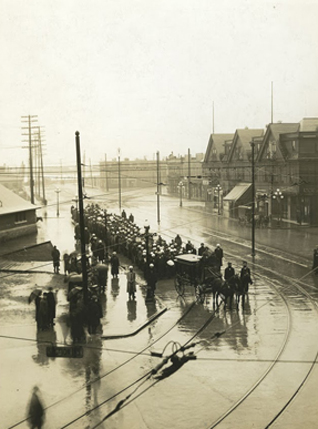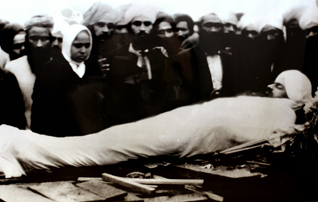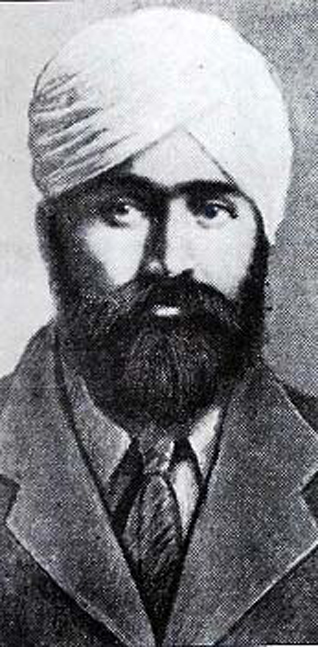Our Heroes
A 100 Years Ago Today ...
Mewa Singh
PANEET SINGH
A century ago on this day, several hundred of once hopeful Sikh-Canadian immigrants walked the streets of Metro Vancouver in a procession. From Downtown New Westminster to Fraser Mills.
The once-hopefuls were hopeful no more. That is not to say they were defeated. Far from it. A dwindling morale once again had reason to rise. The drying roots of these people had been nourished with the substance it was most accustomed to. Spilled blood once again watered these roots.
Mewa Singh, from the village of Lopoke, Punjab, came to Canada in 1906. Along with working in Fraser Mills, he served as the granthi at the Khalsa Diwan Society Gurdwara off of Burrard, located on West 2nd Avenue in Vancouver, British Columbia.
On the morning of October 21, 1914, Mewa Singh assassinated Canadian Immigration Officer William C. Hopkinson. He took full responsibility of his actions from the moment of the assassination, and consequently was hanged on the 11th of January, 1915.
To this day, he is a celebrated hero in the Sikh-Canadian community. Every year since his great sacrifice, his anniversaries are marked with various different festivities in Canada.
A great amount of information is available on the assassination of Hopkinson by Mewa Singh, but it is not easily accessible in one place. Moreover, because of the tragic events of the Komagata Maru that had occurred earlier in 1914, the magnitude of Mewa Singh’s actions and death often gets overlooked.
That being said, I encourage everyone to read Professor Sohan Singh Pooni’s piece on Mewa Singh, which is accessible online.
I put together this piece on this anniversary of Mewa Singh’s death as a humble effort to honour, what I consider to be a selfless and valiant deed. This is by no means meant as an end-all be-all source on Mewa Singh, but rather as a starting point.
Our story starts with turn-of-the-century Canada and its relationship with non-European immigrants. Conditions at this time were harsh for those newcomers in particular, and the trend was going more and more towards banning immigration from Asia altogether.
One such measure that was taken was the “Continuous Passage Act” which stated that any aspiring immigrant must come on a continuous non-stop journey from their country of origin; a feat which was impossible at the time from the subcontinent.
Nonetheless, a Sikh entrepreneur by the name of Gurdit Singh chartered a Japanese ship, the Komagata Maru (which he renamed the ‘Guru Nanak Jahaaz‘) and set course for Vancouver with 376 passengers aboard -- mostly Sikh, along with a handful of Muslims and Hindus.
They were all going with the same goal of establishing a better tomorrow in a new land for themselves, their family, and their community.
In short, when the ship arrived in Burrard Inlet, the passengers were not allowed to enter the country because the government claimed that they had arrived illegally. The ship stayed in the limbo of the Inlet for two months before finally being sent back to the subcontinent. Conditions and rations in the ship had significantly deteriorated, and the passengers were held under inhumane conditions.
Upon its return, the passengers docked in Calcutta and wished to head back to their native Punjab. In a desperate attempt by the British authorities to keep a lid on the mistreatment of these British subjects, they were not allowed to head home. A protest resulted. The police fired on the protesters. Dozens of passengers were killed, others injured; some escaped, and the rest were arrested and either imprisoned or exiled. More were later killed in custody.
This murder of incidents by the British-Indian police is popularly known locally as the 'Budge Budge Riot' after the name of the locality.
Two agents of Canadian Immigration were instrumental in having the ship and its passengers sent back. They were Malcolm R.J. Reid and an Anglo-Indian, William C. Hopkinson, who had been brought in from India for the express purpose of creating foment within the Sikh-Canadian community. Hopkinson was particularly successful in infiltrating the community as he was fluent in Hindi.
Sending the ship back was just one of the actions Reid and Hopkinson took against the Sikh community.
They actively played a role in keeping the immigrants from becoming too powerful of an entity. It was through their infiltration and espionage that Hopkinson and Reid were able to create a hard divide within the community; those who spoke out against the unjust actions of the Canadian government of the time, and those who co-operated and acted as spies for the Immigration officers.
Mewa Singh became involved in the Ghadar Party (a group formed along the West Coast focused on independence of the subcontinent from Britain, as well as being active in promoting the rights of Sikhs and other Indians across the globe) a few years after arriving in Canada. Though a peaceful and pious man, Mewa Singh had heavily antagonized Hopkinson by his refusal to betray his community.
Mewa Singh, along with Gurdwara President Bhag Singh and a few other Sikhs, was going to cross the border to purchase weapons to give to the passengers of the Komagata Maru, in view of their mistreatment despite their being citizens of the British Empire, so that they could defend themselves against the mob that had gathered on shore.
The Sikh-Canadians departed from Khalsa Diwan Society Gurdwara in Abbotsford and acquired the weapons in the US, only to be arrested on the way back. Mewa Singh was held in a New Westminster jail upon being arrested.
Hopkinson came to the jail to offer a bribe to Mewa Singh: if Mewa Singh turned in all of his associates in the arms smuggling case, he would be let off with a fine. If not, his sentence would be doubled in years. Mewa Singh refused and responded in the true defiance that Sikhs have historically been known for in the face of oppressive authority, with the words: “You may cut me to pieces, but I will not tell a lie for your sake.”
Hopkinson, though disappointed, was under the impression that he could soften Mewa Singh and use him in the future if he let him off with a small punishment on this occurrence, and issued him only a fine.
Which brings us to that fateful day of September 5, 1914. A government agent by the name of Bela Singh walked into the Khalsa Diwan Society Gurdwara in Vancouver, during a service which some newspapers reported was for a funeral, and opened fire with two .38 calibre guns. In this attack, Bela Singh managed to kill Gurdwara President Bhag Singh, and another Sikh by the name of Badhan Singh, both instrumental figures in the local chapter of the Ghadar Party.
The attack also wounded nine others, when Bela turned his guns towards those fleeing towards the exits of the gurdwara. It was reported that Bela Singh had been expressly sent by Hopkinson to execute Bhag Singh and other members of the congregation.
Bela Singh was arrested after being identified by witnesses. As well, both Bhag Singh and Badhan Singh identified him as the culprit before they passed away in the hospital on Sunday.
One newspaper reported an interesting anecdote that before Bhag Singh had died, he had said to a physician that “I am going to die. You can do nothing to help me.” Bhag Singh was reportedly a devout Sikh, so even though this statement lacks context, it would not be an unfair assumption to see this as him welcoming death as his bride, with open arms.
In the trial of Bela Singh, many Sikhs present in the gurdwara at the time were being called to testify. Interestingly, as opposed to early reports by newspapers, many testimonies started swaying in favour of Bela Singh. Many of these witnesses had been coerced by Hopkinson through either bribe, threat, or both.
One individual who was called in as a witness, and similarly subjected to such coercion, was Mewa Singh. Thinking he could use Mewa Singh because he had earlier let him off with only a fine, Hopkinson employed the same tactics he had previously used, of bombarding Mewa Singh with threats and bribes to testify in favour of Bela.
Mewa Singh later stated in his report that he was receiving threats from government sympathizers that if he did not testify favourably, they would do with him as they did with Bhag Singh and Badhan Singh.
This was the last straw for Mewa Singh. From 1906 to now he had seen and experienced such a great deal of racism, he had seen the government play with his community like pawns, and he had seen good people forced to perform less than admirable actions because of pressure from the government. Mewa Singh decided it was time to put an end to all of this.
On October 21, 1914, the day Mewa Singh was to testify in court in the Bela Singh case, he walked into the British Columbia Provincial Courthouse with different intentions.
He entered the building, where he met Hopkinson in a corridor. Then, without a word, as cold as the death he was about to deliver, Mewa Singh pulled out two revolvers from his pockets and unloaded five rounds. Four rounds hit Hopkinson, but one alone that had pierced him through his heart was enough to send him on from this world.
Mewa Singh was restrained by a janitor of the building, as well as a few officers and bystanders. Upon being arrested, Mewa Singh assumed full responsibility of his actions, immediately shouting this slogan in his broken English: “I shoot. I go to station.” Meaning, he was indeed the one who had performed the shooting, and the consequences were irrelevant to him.
Upon being taken to jail, Mewa Singh openly professed about how he was glad about what he had done, and ready to face the consequences. It is reported that he had a smile on his face as he paced up and down his cell where he was being held, and was constantly singing shabads. His trial date was set as quickly as possible, and on October 30, Mewa Singh was scheduled to give his testimony in court.
Nothing had changed from the moment of the assassination. Mewa Singh believed he had delivered justice and had taken full ownership of his actions. He initially refused to take on a defense attorney, but was made to by the court. While he refused to take the stand to defend himself, Mewa Singh did indeed present a rather lengthy statement, which was translated by the court interpreter and read by his lawyer. These excerpts from his statement show that he did not present himself in court to defend himself against the consequences, but rather to relay a message:
“My name is Mewa Singh. I am a God-fearing man and offer prayer daily. I have no words on my tongue to tell what various difficulties, hardships and harassments I had to pass through in Vancouver ... We Sikhs go [to the gurdwara] to offer prayer but these wicked ones opened fire in the gurdwara, killed Bhai Bhag Singh and thus desecrated the sanctity of the gurdwara. These sinners have orphaned two innocent children. The treacheries committed by these wicked ones in the gurdwara have put my heart on fire. Mr. [Reid] and Mr. Hopkinson are responsible for all this. For the honour and prestige of my religion and community, I have killed Hopkinson. It was beyond me to tolerate all this …
“Had all this taken place in your church, you Christians could not have tolerated this because, by doing so, you would have taken yourself as a dead nation. For a Sikh also, it is better to die than bearing with such acts in [the gurdwara] ...
“I have all the time been insisting that [I do not need a lawyer]. I hope for no justice. I know that I have shot Hopkinson and I have to die for this. I am giving this statement for this purpose that the public may know what suffering we have been going through. We have never got any justice from judges, police or from any other source. I am giving my life for this purpose that the people may know all this ...
“Our worthy judges and lawyers must realize why Hopkinson has been fired at. [The people] who [constantly commit bad actions, and do so after getting drunk] are considered correct by the Immigration Officers and we, the God-fearing true people, are trampled under [their] feet. Abiding by God’s Order, I can bear this no more.”
Mewa Singh was sentenced to death after a short jury deliberation and his sentence was to be carried out on January 11, 1915.
On the day of Mewa Singh’s hanging, he went to the gallows, as reported by newspapers, with “chant on his lips.” Mewa Singh showed no signs of nervousness or fear as they prepared him for hanging. The only person allowed to view the hanging (note: recent evidence suggests that others may have been present) from the Sikh community was Bhai Mit Singh, the granthi from the gurdwara.
Together, he and Mewa Singh never stopped their devotional chant until the very moment the scaffolding gave way to let Mewa Singh make the short plunge of death.
His body was then taken by a group of Sikhs from the site of the hanging to the BCER Depot. From there, between 300-400 Sikhs got together and walked four miles to Fraser Mills in a Nagar Kirtan (procession), where Mewa Singh’s body was cremated.
Mewa Singh died being considered a murderer by the very bureaucracy he had challenged, but a hero by his community. To this day, he is universally revered and honoured by Sikhs and non-Sikhs alike across the globe.
100 years later, it is time to re-open the discussion of Mewa Singh in the wider community, and identify the intentions and virtues of his actions.
Please CLICK here for details of The Mewa Singh Centennial Commemoration in Canada and the US.
[The author is a Vancouver-based writer and filmmaker. As a graduate of
The Vancouver Film School, he currently teaches acting and drama to
young children and youth. Despite switching over from studying history
to film in university, Paneet continues to take a keen interest in Sikh
and world history.]
[Courtesy: "There’s Gum on The Bottom of Your Shoe.” Edited for sikhchic.com]
January 11, 2015
Conversation about this article
1: Harinder Singh 1469 (New Delhi, India), January 13, 2015, 6:18 AM.
Hats of to sikhchic.com for sharing articles which are so intricately tied to our faith and history. Let's not ignore such wonderful stories - rather we must share them with our loved ones and with future generations. This is our history ... and we stand on the shoulders of such heroes who did so much at their personal expense to ensure that we as a community prospered in the future.





